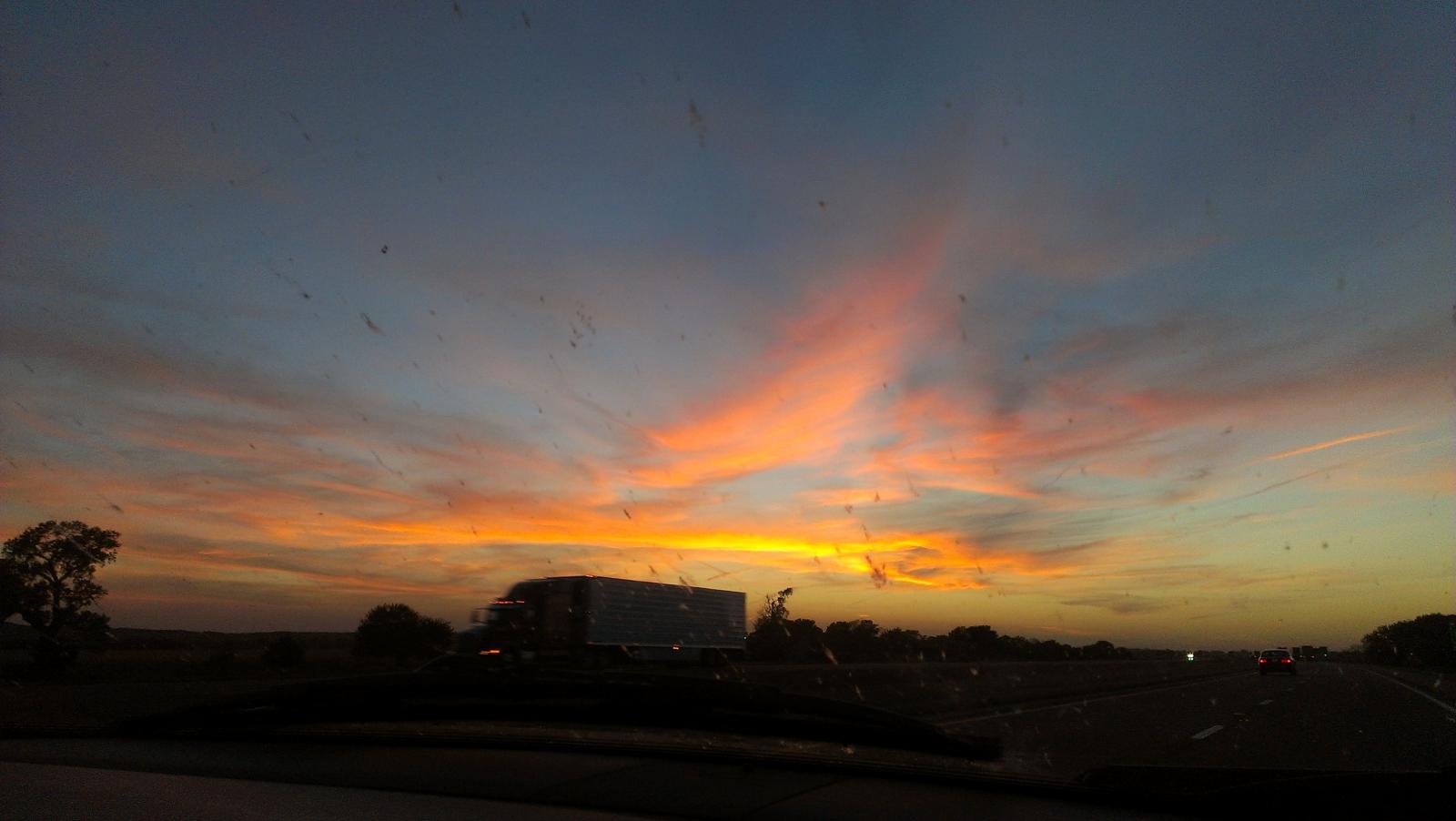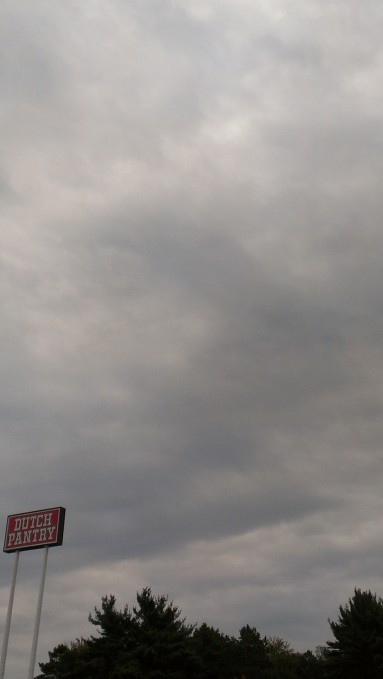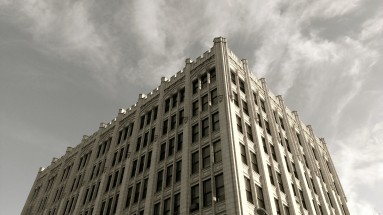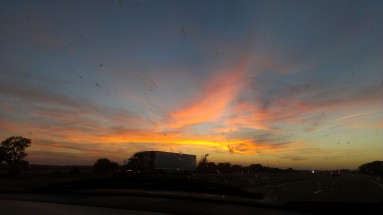[Last week I drove across the country with my father, taking the entire length of I-80, ending in California. This is an account of that trip.]
As we rolled through the last checkpoint before The Hinterland, the apparently drunk guards greasily fingering their triggers, I plopped three drops into each eye, as I always did. The slick solution stung slightly, its reek geriatric, bleached and ugly. Blinked my eyes wet, watched hands smear into flippers or mittens, waved them around, swimming inside the car’s cramped box. My father sighed, pointedly. He found these preparations, and the “superstition” that necessitated them, wholly ridiculous.
You know this song and dance isn’t necessary, he told me. But he didn’t push it, went quiet as I hummed loudly and dog paddled the phantom breakers over the cracked dash. Just because he found it ridiculous didn’t mean he didn’t also, in his own way, believe it wholly necessary.
To each - my hands crackling into perfect resolution - his own, I replied, and to me, how bout a little silence, huh?, as I splayed the lids dissection-wide with my fingers and turned to face the window.
Behind me, I heard his mouth open and start to form words, probably to tell me that to him A little god damned respect, but my hearing had gone dead, flat and mute, followed in rapid succession by taste and smell and, finally, touch, aware only of the slight sensation of being a substantial heap of warm solids and hot liquids, as the solution did its work of diverting all sensory circuits to sight alone.
And so I saw.
Even at 100 miles per hour, I saw, I saw everything. Each leaf that had a slight deformity or tear and each leaf that did not. Each bottle, each piece of glass that belonged to a bottle, the shape of its break itself hung up on its echo. The pollen in the air. A bee. The position of the wings of the bee. The position of the pollen smirching the wings. Bark, the nooks and scars of bark. A nut on the back of a bolt on the next exit sign backed out a fifth of a turn in its expansive rusting. A second bolt that had not. The winded tremor of that hardly loosened sign.
I saw it all, and it was too much to remember, even as it happened. Each moment filled the entirety of my available memory, swollen with tiny pins of light and data, and, the deep reptilian urge sunken below the immemorial circuits not finding the single thing worth remembering, each moment was blasted loose by a next, a next tiny advance in position bringing new matter of concern into the frame of the car’s window, new blades of grass, another portion of cloud, three crickets, a fourth missing a third of a leg. I can’t say if I actually saw any of those things I’ve listed. I might have. But none of it can, or could, be remembered. There might have even been bears, I suppose, because while that sounds like something to be remembered, especially for those like myself who don’t have a lot of experience with such large mammals, they were not the specific thing that had to be. Maybe there was a flock of bears, more than had ever been recorded and which will go forgotten. Instead, I saw. I saw and saw.
Then I saw it. The first omen. A thing to be remembered:
A motorcycle and its rider, there by the side of the road. Both had been entirely dissembled and carefully piled in the husky afternoon light, the kidneys and clutches and mufflers and vocal cords stacked neat beside their scrapped frames of bone and metal.
A good omen. But just one. Which didn’t mean jack until set against a second.
I saw. Green, bears, glass, whatever.
Five miles down the road:
A vulture, stripped for parts.
Aw fuck. Not again.
It was going to be that kind of trip.
—
—
Scranton, the Electric City had gone underwater. I thought to blame this on the general rising of the oceans. Perhaps. The standing water of the The Hinterland did love a valley. But it seemed more like it had gone underwater, much as one might go underground after killing a city in broad daylight. We walked through the streets, my father and I, like swimming and he pointed out to me the statue-covered monument for a war, although we couldn’t read which one. Given the antiquated nature of their headwear, I suspected something from the last century, from the early part of it. He nodded. The buildings were all granite, and they were oddly lovely, with more decoration over their doorways and windows than you’d think necessary for a city of industry, especially one lit with electricity so early in that technology’s career.
High above, where the surface of the water lapped at the 8th story of the building, something wobbled on the small waves. A fox was floating on the door of a house. The house was nowhere to be seen. The sun bore brilliant down on it, so that the shadow cast by even that moderate sized door was tremendous, throwing one of the smaller buildings fully into looming dark.
I had a hard time deciding whether or not the fox had decided on this act itself, or if someone ill-tempered placed it there to be cute or vile. Obviously, foxes swim quite well. If it wanted to leave, surely it could. I pointed this out to my father, who agreed.
Yes, he said, they swim that well. If they were ever to attack a bear, for a good reason, they’d probably pile into a river, skinny as hell, all ribs under drenched fur, and point themselves downcurrent toward the rapids where the bear faced the other way, busy snagging the spawning salmon between his fox-head-sized paws. We were on the surface, having a hard time deciding whether to breathe air or water. Unsuspected and unseen, they’d strike blindside, take the head clean off. But, he said, that doesn’t much matter when hunted from below. The swimming, that is.
Isn’t that the truth, I told him, shaking my head sadly, as I watched the ex-engineers, housewives, insurance agents, and schoolteachers of the Electric City grab the fox with their distended arms, not even giving it the honor of a harpoon, and take it far, far below, to eat or skin or drown, all likely beside a monument itself carved of granite and for a war whose name cannot be recalled.
—
A stripped Burger King.
—
The roads of The Hinterland were blasted, as though with salt. When one looked down out the window of the car at the road, its deep pocks and scars blurred together into furrows and wrinkles. The tires absorbed most of it, although our teeth chattered constantly as if we were cold. Getting a flat here was deadly, seriously deadly. Not because of wolves, who had been as confused as foxes recently. Because of the elderly. When our headlights raked the waiting woods along a curve, their eyes, clouded over with glaucoma, peered back, unstartled, ravenous, dull as milk.
You have to keep carrying the fire, son. No matter how hard the going gets.
Sure, I know.
If we’re no better than the bad guys, then what are we? He was gesticulating with the pig-grease Colt for emphasis.
Yeah, yeah, I know, I know, I muttered, looking at the eyes of the old that could barely see anymore, just looked right through me to the rheumy night beyond.
—
A stripped tractor.
—
Further west, the leaves are changing. Despite the urgency of the trip, we had somehow forgotten it was fall. I unrolled the window and yes, it was true, the air had a clarity to it, the smokiness not of snow on the way but summer’s damp leftovers blown up and out to sea by new wind. Soon the leaves would shake and find color, as if lit slow in a crayon fire, and then it would be the time for them to fall, to be swept into piles, to be burnt along with those accused of witchcraft and dragged howling from their houses by others, out through the drunken lilt of leaves on their way down as unfamiliar cats slipped quiet out the back and made a break for the woods.
The pernicious asshole at the gas station seemed to think I might be one. Something about the shape of my coat or what was under it set him off.
You one of them man witches, son?
A manwich? What, you mean like sodomy? Two slices, a little oil between?
He sputtered and drew up close to me. I could smell the fresh rot of his gums. Old bacon in the urinal. Sadly, I had all my senses back.
Listen, he hissed, drawing breath, those busted gums puckering up to the black base of the teeth and flaring out with each exhalation, this isn’t the town for jokers or sodomy persons or man witches.
Warlocks, I told him. They’re called warlocks.
Who are, sodomy persons?
Male witches.
Fuck’s the difference. They’re all the same thing.
There was blood, almost yellow, seeping from the gums. I looked away and up. Someone had painted a sloppy white cross next to the name of the gas station.
Is this a God-fearing station? I asked, reverential.
He was taken aback. Why yes, yes it is.
And that goes for all on this property?
Of course, of course. He paused. I’m sorry for my questions earlier. Are you a…
I cut him off. So this gasoline too, this blessed fuel that courses through the engine, the fire that drives pistons is the very unleaded breath of Jesus Himself, not his body or blood but his very breath, huffing the bellows of the steel, sending those brave pilgrims roaring across the land like Saint George on the hot-wired dragon himself?
Well, he chuckled nervously, I don’t… I don’t know about all that.
Fucking heathen! I yelled and laughed wild and opened my coat wide, so very wide.
It was almost sunset and very nearly fall, and although the leaves didn’t quite yet look like small tongues of fire, there in the rearview mirror, soaked in the shuddering flames of the station, it wasn’t especially hard to imagine so.
—
A stripped bank.
Didn’t even have to point that one out. You couldn't miss it, outside wall splattered with the marking ink of its disemboweled ATM, wearing the evidence of its own crime, a suicide caught blue-handed.
Things were looking up.
—



